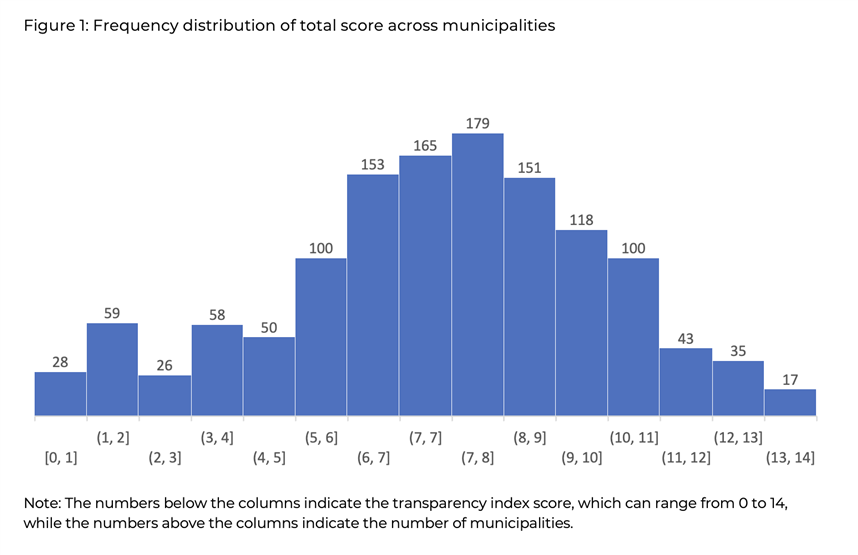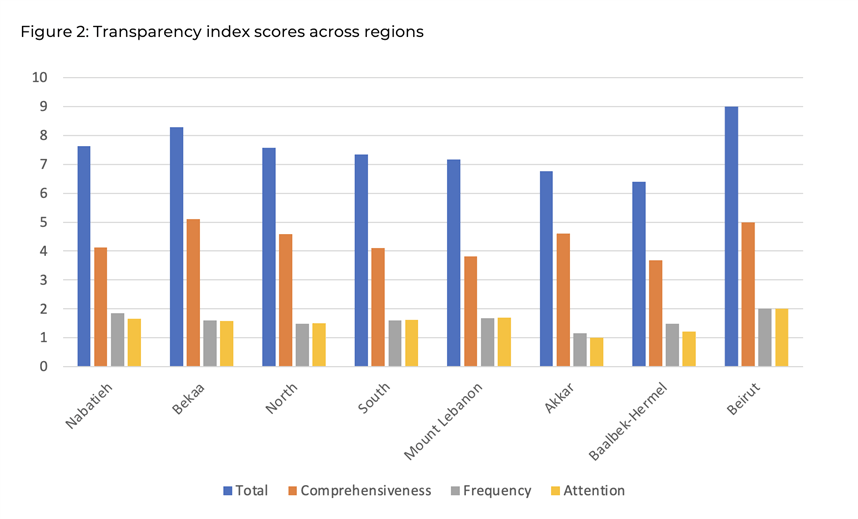- عربي
-
- share
-
subscribe to our mailing listBy subscribing to our mailing list you will be kept in the know of all our projects, activities and resourcesThank you for subscribing to our mailing list.
How Transparent are Lebanon’s Municipalities?
Introducing the Institutional Transparency Index
Poor public sector governance is a central obstacle to economic and social development in Lebanon. Coordination among municipalities and the central government has long been particularly problematic, leading to inefficiencies in the way these institutions share and leverage information, such as new regulations. Little information and data on local governance have been systematically collected and shared with the public, contributing to leaving citizens increasingly frustrated and alienated from bureaucrats and politicians.
In an effort to facilitate the exchange of information between central and local governments, the Central Inspection (CI) required in 2019 municipalities to share a range of data on development and governance issues on the IMPACT platform. The platform covers issues such as the administration of the response to the COVID-19 pandemic, the assessment of municipal development, or the publication and dissemination of decisions that govern municipal affairs. The exchange of such information can help ministries make more informed decisions, municipalities learn from each other’s experiences, and citizens have transparent oversight into their municipality’s workings.
We developed the Institutional Transparency Index (ITI) to assess the extent to which municipalities leverage the IMPACT platform to share and disseminate information on local governance. The index introduces three dimensions of transparency and ranks municipalities vis-à-vis each other. The first component captures the comprehensiveness of data in terms of the degree to municipalities provided the data the CI requested them to provide. The second component reflects whether municipalities distribute their attention equally across issues or whether they focus only on a few. The third dimension measures the extent to which municipalities engage frequently and consistently with the platform.1
Out of the country’s 1,002 municipalities, only 17 received the full score and showed near full transparency and regular interaction with the platform
Transparency of municipalities varies across Lebanon
The ITI shows that municipalities vary in the degree to which they provide different information, which reflects the need for many municipalities to adopt and improve norms of transparency. Out of the country’s 1,002 municipalities, only 17 received the full score and showed near full transparency and regular interaction with the platform (figure 1). Among the most transparent municipalities are Jbeil, Ketermaya in Chouf, and Zefta in Nabatieh, as well as 14 others all over the country.
Figure 1

At the other end of the spectrum, 28 municipalities did not engage with the tool at all, while another 59 showed very limited engagement and received only 1 point. Among the municipalities that did not receive any points are Batroun and many surrounding municipalities, Taanayel in Zahle, and Bafrouh in Nabatieh. Most municipalities have a medium degree of interaction with the platform, reflecting the vast potential to improve transparency with the IMPACT platform.2
Figure 2

1- For each dimension, municipalities obtain points which are aggregated to compose an overall index, ranging from 0 to 14 points for the most transparent municipality. For more information on the methodology, see: The Policy Initiative. 2021. “Strategic Guidance Notes for IMPACT.”
2- A list of all municipalities can be found here: https://impact.cib.gov.lb/home?dashboardName=user-activity.
From the same author
view all-
09.21.23
مشروع موازنة 2023: ضرائب تصيب الفقراء وتعفي الاثرياء
وسيم مكتبي, جورجيا داغر, سامي زغيب, سامي عطا الله -
10.12.22eng
فساد في موازنة لبنان
سامي عطا الله, سامي زغيب -
06.14.24
عطاالله: التدّخل السياسي عقبة أمام تطوّر الإدارة العامة
سامي عطا اللهمقابلة مع مدير مبادرة سياسات الغد الدكتور سامي عطاالله أكد أن "التدخل السياسي هو العقبة الرئيسية أمام تطور الإدارة العامة"، وشدد على أن دور الدولة ووجودها ضروريان جدًا لأن لا وجود للاقتصاد الحر أو اقتصاد السوق من دونها"
اقرأ
More periodicals
view all-
06.14.24
عطاالله: التدّخل السياسي عقبة أمام تطوّر الإدارة العامة
سامي عطا اللهمقابلة مع مدير مبادرة سياسات الغد الدكتور سامي عطاالله أكد أن "التدخل السياسي هو العقبة الرئيسية أمام تطور الإدارة العامة"، وشدد على أن دور الدولة ووجودها ضروريان جدًا لأن لا وجود للاقتصاد الحر أو اقتصاد السوق من دونها"
اقرأ -
10.27.23eng
تضامناً مع العدالة وحق تقرير المصير للشعب الفلسطيني
-
09.21.23
مشروع موازنة 2023: ضرائب تصيب الفقراء وتعفي الاثرياء
وسيم مكتبي, جورجيا داغر, سامي زغيب, سامي عطا الله -
09.09.23
بيان بشأن المادة 26 من مشروع قانون الموازنة العامة :2023
-
08.24.23
من أجل تحقيق موحد ومركزي في ملف التدقيق الجنائي
اقرأ -
07.27.23
المشكلة وقعت في التعثّر غير المنظّم تعليق دفع سندات اليوروبوندز كان صائباً 100%
-
05.17.23
حشيشة" ماكينزي للنهوض باقتصاد لبنان
-
01.12.23
وينن؟ أين اختفت شعارات المصارف؟
-
10.12.22eng
فساد في موازنة لبنان
سامي عطا الله, سامي زغيب -
06.08.22eng
تطويق الأراضي في أعقاب أزمات لبنان المتعددة
منى خشن -
05.11.22eng
هل للانتخابات في لبنان أهمية؟
كريستيانا باريرا -
05.06.22eng
الانتخابات النيابية: المنافسة تحجب المصالح المشتركة


